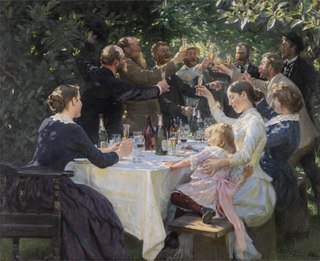
A party is a gathering of people who have been invited by a host for the purposes of socializing, conversation, recreation, or as part of a festival or other commemoration or celebration of a special occasion. A party will often feature food and beverages, and often conversation, music, dancing, or other forms of entertainment.
"Going Dutch" is a term that indicates that each person participating in a paid activity covers their own expenses, rather than any one person in the group defraying the cost for the entire group. The term stems from restaurant dining etiquette in the Western world, where each person pays for their meal. It is also called Dutch date, Dutch treat, and doing Dutch.

Xenia is an ancient Greek concept of hospitality. It is almost always translated as 'guest-friendship' or 'ritualized friendship'. It is an institutionalized relationship rooted in generosity, gift exchange, and reciprocity. Historically, hospitality towards foreigners and guests was understood as a moral obligation. Hospitality towards foreign Hellenes honored Zeus Xenios, patrons of foreigners.

The open-fields doctrine, in the U.S. law of criminal procedure, is the legal doctrine that a "warrantless search of the area outside a property owner's curtilage" does not violate the Fourth Amendment to the United States Constitution. However, "unless there is some other legal basis for the search," such a search "must exclude the home and any adjoining land that is within an enclosure or otherwise protected from public scrutiny."
Katz v. United States, 389 U.S. 347 (1967), was a landmark decision of the U.S. Supreme Court in which the Court redefined what constitutes a "search" or "seizure" with regard to the protections of the Fourth Amendment to the U.S. Constitution. The ruling expanded the Fourth Amendment's protections from an individual's "persons, houses, papers, and effects", as specified in the Constitution's text, to include any areas where a person has a "reasonable expectation of privacy". The reasonable expectation of privacy standard, now known as the Katz test, was formulated in a concurring opinion by Justice John Marshall Harlan II.

Hospitality is the relationship of a host towards a guest, wherein the host receives the guest with some amount of goodwill and welcome. This includes the reception and entertainment of guests, visitors, or strangers. Louis, chevalier de Jaucourt describes hospitality in the Encyclopédie as the virtue of a great soul that cares for the whole universe through the ties of humanity. Hospitality is also the way people treat others, for example in the service of welcoming and receiving guests in hotels. Hospitality plays a role in augmenting or decreasing the volume of sales of an organization.
Email privacy is a broad topic dealing with issues of unauthorized access to, and inspection of, electronic mail, or unauthorized tracking when a user reads an email. This unauthorized access can happen while an email is in transit, as well as when it is stored on email servers or on a user's computer, or when the user reads the message. In countries with a constitutional guarantee of the secrecy of correspondence, whether email can be equated with letters—therefore having legal protection from all forms of eavesdropping—is disputed because of the very nature of email.
Taarof or Tarof is a Persian word that refers to an Iranian form of civility or art of etiquette that emphasizes both deference and social rank.
In United States constitutional law, expectation of privacy is a legal test which is crucial in defining the scope of the applicability of the privacy protections of the Fourth Amendment to the U.S. Constitution. It is related to, but is not the same as, a right to privacy, a much broader concept which is found in many legal systems. Overall, expectations of privacy can be subjective or objective.

Matthew 10:13 is the thirteenth verse in the ninth chapter of the Gospel of Matthew in the New Testament.
Etiquette rules in the United States and Canada generally apply to all individuals, unlike cultures with more formal class structures, such as those with nobility and royalty.

The second season of Pinoy Big Brother: Celebrity Edition premiered on the ABS-CBN network on October 14, 2007 and ran for 84 days until January 5, 2008.
Homestay is a form of hospitality and lodging whereby visitors share a residence with a local of the area (host) to which they are traveling. The length of stay can vary from one night to over a year and can be provided for free, in exchange for monetary compensation, in exchange for a stay at the guest's property either simultaneously or at another time, or in exchange for housekeeping or work on the host's property. Homestays are examples of collaborative consumption and the sharing economy. Homestays are used by travelers; students who study abroad or participate in student exchange programs; and au pairs, who provide child care assistance and light household duties. They can be arranged via certain social networking services, online marketplaces, or academic institutions. Social networking services where hosts offer homestays for free are called hospitality exchange services.
Information technology law, also known as information, communication and technology law or cyberlaw, concerns the juridical regulation of information technology, its possibilities and the consequences of its use, including computing, software coding, artificial intelligence, the internet and virtual worlds. The ICT field of law comprises elements of various branches of law, originating under various acts or statutes of parliaments, the common and continental law and international law. Some important areas it covers are information and data, communication, and information technology, both software and hardware and technical communications technology, including coding and protocols.
Saʽd ibn ʽUbadah ibn Dulaym Al Ansari was the chief of the Sa'ida clan of the Khazraj tribe in Medina in the early seventh century. He was later recognised as the chief of the whole Khazraj tribe, and then of all the Ansar. He was a prominent companion of the Islamic prophet Muhammad and he made an abortive attempt to nominate himself as caliph of Islam after Muhammad's death.

The doctrine of legitimate expectation in Singapore protects both procedural and substantive rights. In administrative law, a legitimate expectation generally arises when there has been a representation of a certain outcome by the public authorities to an individual. To derogate from the representation may amount to an abuse of power or unfairness. The doctrine of legitimate expectation as a ground to quash decisions of public authorities has been firmly established by the English courts. Thus, where a public authority has made a representation to an individual who would be affected by a decision by the authority, the individual has a legitimate expectation to have his or her views heard before the decision is taken. Alternatively, an individual may also have a legitimate expectation to a substantive right. The recognition of substantive legitimate expectations is somewhat controversial as it requires a balancing of the requirements of fairness against the reasons for any change in the authority's policy. This suggests the adoption of a free-standing proportionality approach, which has been said not to apply in administrative law.
Ontario v. Quon, 560 U.S. 746 (2010), is a United States Supreme Court case concerning the extent to which the right to privacy applies to electronic communications in a government workplace. It was an appeal by the city of Ontario, California, from a Ninth Circuit decision holding that it had violated the Fourth Amendment rights of two of its police officers when it disciplined them following an audit of pager text messages that discovered many of those messages were personal in nature, some sexually explicit. The Court unanimously held that the audit was work-related and thus did not violate the Fourth Amendment's protections against unreasonable search and seizure.
O'Connor v. Ortega, 480 U.S. 709 (1987), is a United States Supreme Court decision on the Fourth Amendment rights of government employees with regard to administrative searches in the workplace, during investigations by supervisors for violations of employee policy rather than by law enforcement for criminal offenses. It was brought by Magno Ortega, a doctor at a California state hospital after his supervisors found allegedly inculpatory evidence in his office while he was on administrative leave pending an investigation of alleged misconduct. Some of what they uncovered was later used to impeach a witness who testified on his behalf at the hearing where he unsuccessfully appealed his dismissal.

Florida v. Jardines, 569 U.S. 1 (2013), was a United States Supreme Court case which resulted in the decision that police use of a trained detection dog to sniff for narcotics on the front porch of a private home is a "search" within the meaning of the Fourth Amendment to the United States Constitution, and therefore, without consent, requires both probable cause and a search warrant.
Minnesota v. Olson, 495 U.S. 91 (1990), is a landmark search and seizure case decided by the Supreme Court of the United States. In a 7-2 decision, the court held that a person staying as a guest in the house of another had a legal expectation of privacy, and that a warrantless entry into that house to arrest the person tainted the arrest and the individual's subsequent statements.










